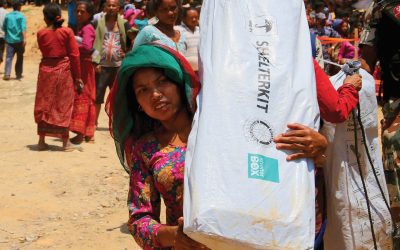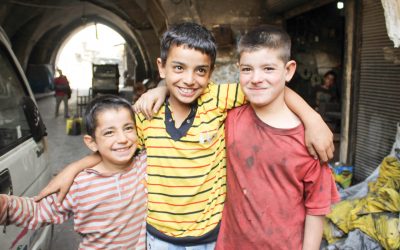The Technical Advisory Group for Polio in Pakistan (TAG) met in Islamabad in June to deliberate on efforts to stop transmission of the polio virus. Senator Ayesha Raza Farooq, The Prime Minister’s focal person for Polio Eradication, assured the ninety polio eradication experts present, that failure is not an option.
This determination to succeed was evident in every meeting attended by the Rotary International delegation to Pakistan. The delegation was led by Michael McGovern, Chair of Rotary International’s PolioPlus Committee, accompanied Committee Director Dr Carol Pandak and Committee Member Judith Diment. The five days were masterminded by Aziz Memon, Chair of the National PolioPlus Committee in Pakistan, ably assisted by Asher Ali.
First stop was in Karachi to meet Polio Ambassador Aseefa Bhutto Zardari who pledged her full commitment to a polio free Pakistan in 2016. Aseefa tweeted, “I believe in Rotary and Pakistan’s strong partnership to eradicate polio. I know we can succeed when we join together for a polio free world.”
Vaccinating missed children is a vital component in the polio programme. We visited the Permanent Transit Post in Karachi to observe polio vaccines being administered to children in transit. We spoke with the vaccinators who said an average of 3,000 children are vaccinated every day. Buses coming from upcountry were stopped at the check post to ensure every child under five was given the polio drops.
Karachi, is one of the two reservoirs of polio in Pakistan where we visited the Gulshan Town Resource Centre on the outskirts. It is a polio high risk area. Our partners from the World Health Organization (WHO) were able to provide details of the collaborative work with the Resource Centre. The focus was on the newly established cadre of Female Community Volunteers and their training. Plans were discussed, the challenges they face, and their crucial role in engaging the local communities.
Another important part of the strategy of the National PolioPlus Committee in Pakistan is the response to vaccinate displaced children, create strong emergency operations centres, and a robust plan, based on lessons learned, to access children in insecure areas.
We as partners are now deeply entwined as we push towards zero.”
The National PolioPlus Committee has established 16 Permanent Transit Posts and nine Polio Resource Centres. This strategy was discussed at a meeting with the Karachi Commissioner Ejaz Ahmed Khan. Aziz Memon commented that we were lucky to have a Commissioner with a Pashtun background to enable better understanding of Pashtun culture. Aziz went on to say that “The Commissioner has experience of working with polio since 1995 in areas of Khyber Pakhtunkhawa (KPK)”. Michael McGovern emphasized the need for improved security to polio workers and the need to enhance the coverage of children in the high risk areas.
Further briefings in Karachi were held with Dr Azra Pechuho, Chairperson Oversight & Coordination Committee on Vertical Projects, Health Department and the Sindh Governor Dr Ishrat ul Ebad. Dr Pechuho assured the delegation that the situation is improving with better monitoring and surveillance and more focus is being given to Northern Sindh where two cases were reported in 2016.
Our next stop was a two-day TAG meeting in Islamabad. The meeting was convened by WHO and attended by Pakistan Federal Government Ministers, provincial government representatives, the leaders of the polio programme at WHO, UNICEF, Centres for Disease Control and Prevention (CDC), Bill & Melinda Gates Foundation, and diplomats from donor countries. The discussions focused on the polio eradication strategy in light of the current situation in high risk areas of Karachi, Northern Sindh, Federally Administered Tribal Areas (FATA), KPK and Quetta block.
Updates were given on all aspects of the programme including a review of the Emergency Operations Centers. Heath Minister Muhammad Ayub Sheikh said, “Substantial progress has been made this year with a continued sharp decline in recorded polio cases and an increasing number of negative environmental samples across Pakistan. We remain on track to interrupt transmission and are fully aware of the remaining challenges.” Senator Ayesha Raza Farooq briefed the meeting about the implementation of the National Emergency Action Plan in the past year. “We as partners are now deeply entwined as we push towards zero. We will succeed or fail together but failure is not an option.”
Michael McGovern reaffirmed Rotary’s commitment to polio eradication and Aziz Memon gave an update on Rotary activities in Pakistan. While in Islamabad we had the honour of meeting with the Acting President of Pakistan HH Senator Raza Rabbani at President’s House and separate meetings with Health Minister Sheikh, Senator Farooq and the High Commissioner for Canada.
Acting President Rabbani has helped extend the outreach for polio to 600,000 children in the FATA area.
We will succeed or fail together but failure is not an option.”
In contrast the final day was spent in the field in KPK, a six hour drive from Islamabad. En route we stopped to inspect two Permanent Transit Posts ready to be installed in the FATA area bordering Peshawar to target children in transit. The buildings are converted from shipping containers for the purpose.
Our next assignment was in Bara Banda, a village in Nowshera District in KPK where Carol Pandak was invited to inaugurate a new Permanent Immunisation Centre. The Centre is managed by Youth Catalyst Rotary’s local partner and overseen by the Rotary Club of Islamabad Metropolitan. The centre helps strengthen routine immunisation and increase awareness of the polio vaccine. We were greeted with garlands from local health workers and we went with children to visit their school where we met teachers and parents.
The final stop was Mansehera City, a major stop for tourists on the Karakoram Highway, which leads to China. We went via Abbottabad (former home of Osama bin Laden) and Balakot where in recent months there has been an influx of Afghan refugees. We visited the Polio Resource Centre, which targets children in refugee camps and other children of nomads and transient population.
Rotary works closely with Dr Shehzad Ali the District Health Officer in Mansehra who thanked Rotary for establishing the centre. We visited the district hospital in Mansehra for a meeting with 40 religious scholars and local Ulemas from the district. The ulemas assured Rotary of their full support to help rid Pakistan of polio.
We left Mansehra with a police escort to get flights home from Islamabad. We all felt humbled by the efforts of our colleagues in Pakistan and proud to be Rotarians. No Rotary trip would have been complete without great Rotary fellowship and we attended two memorable Rotary meetings in our honour in Karachi and Rawalpindi.
During the five-day visit we witnessed the total commitment, dedication and resolve of Rotarians to rid Pakistan of polio, often in difficult, challenging and life threatening conditions. Everyone we met is working as a team to honour Rotary’s commitment to the children of the world to end polio forever.
I urge Rotarians in Great Britain and Ireland to support their colleagues in Pakistan and elsewhere to make this a reality.
Judith is Chair of the Polio Eradication Advocacy Task Force and a member of Rotary International’s PolioPlus Committee


























































